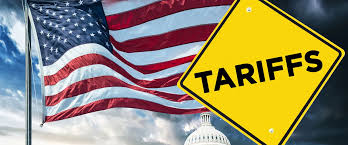- BY Kevin Barry BSc(Hons) MRICS
- POSTED IN Latest News
- WITH 0 COMMENTS
- PERMALINK
- STANDARD POST TYPE

The net effect of Donald Trump’s tariffs applied to date (as of August 1, 2025) on UK construction products and services is multifaceted, with both direct and indirect impacts.
Below is a summary based on available information:
1. Direct Impact on UK Construction Products: – 10% Tariff on UK Goods: The US has imposed a 10% tariff on most UK goods, including construction products like steel, aluminum, and potentially timber, though exemptions exist for certain products (e.g., pharmaceuticals, semiconductors, and copper). This tariff increases costs for US importers, potentially reducing demand for UK construction materials, particularly high-value or specialized products. However, trade in construction products between the UK and US is relatively small, and the sector is less reliant on trans-Atlantic trade compared to others.
– Localized Sourcing Advantage: Construction products like concrete, bricks, and cement are typically sourced locally due to high transportation costs, mitigating the tariff’s impact. However, globally traded materials like steel and aluminum face increased costs, though the UK benefits from a lower tariff rate (25%) on steel compared to other countries (50%).
– Potential Price Suppression: Increased US tariffs on other countries (e.g., China, Canada, Mexico) may divert their construction product exports to the UK and EU markets, increasing supply and potentially lowering prices, which could alleviate cost pressures on UK construction projects.
2. Indirect Economic Impacts: – Global Economic Slowdown: Tariffs have contributed to fears of a US recession and reduced global growth, with forecasts predicting UK GDP could be 2.5–3% lower over five years and 0.7% lower in 2025 due to higher global interest rates and supply chain disruptions. This could dampen demand for construction services, both domestically and internationally.
– Exchange Rate Volatility: Tariff-induced fluctuations in the pound’s value could increase import costs for UK construction firms relying on foreign materials, potentially raising project costs if passed on to consumers.
– Interest Rate Effects: A potential drop in interest rates, as a byproduct of economic turmoil, could facilitate capital investment in UK construction projects, offering a silver lining.
3. Impact on UK Construction Services: – Service Exports Exempt: UK architectural and construction services, which form a significant portion of exports to the US, are exempt from tariffs, providing some insulation. However, a US recession could reduce demand for these services.
– Supply Chain and Demand Risks: Services linked to goods (e.g., after-sales or project management) could see reduced demand if US tariffs decrease trade in related products. Weaker global growth may also impact demand for UK services in other markets.
4. Potential Upsides: – Trade Diversion Benefits: Higher US tariffs on competitors (e.g., 145% on China) could divert trade opportunities to the UK, potentially increasing UK exports of certain construction products to the US or other markets.
– Negotiated Mitigations: The UK-US trade deal announced on May 8, 2025, aims to mitigate tariff impacts, particularly on steel and aluminum, though reductions are not yet in force.
5. Overall Net Effect: – The immediate impact on UK construction products is limited due to low trans-Atlantic trade volumes and localized sourcing, but globally traded materials like steel face higher costs. Services are relatively insulated but vulnerable to reduced demand from a US economic downturn.
– Indirect effects, such as slower UK economic growth, exchange rate volatility, and potential supply chain disruptions, pose greater risks to the construction sector than direct tariff costs.
– Potential benefits include lower material prices from diverted trade and increased export opportunities, but these are uncertain and depend on global responses. In conclusion, the net effect is moderately negative, primarily due to indirect economic pressures rather than direct tariff impacts, with some potential for offsetting benefits if trade diversion materializes. The UK construction sector’s resilience is supported by its low reliance on US trade and service export exemptions, but broader economic uncertainties remain a concern.
